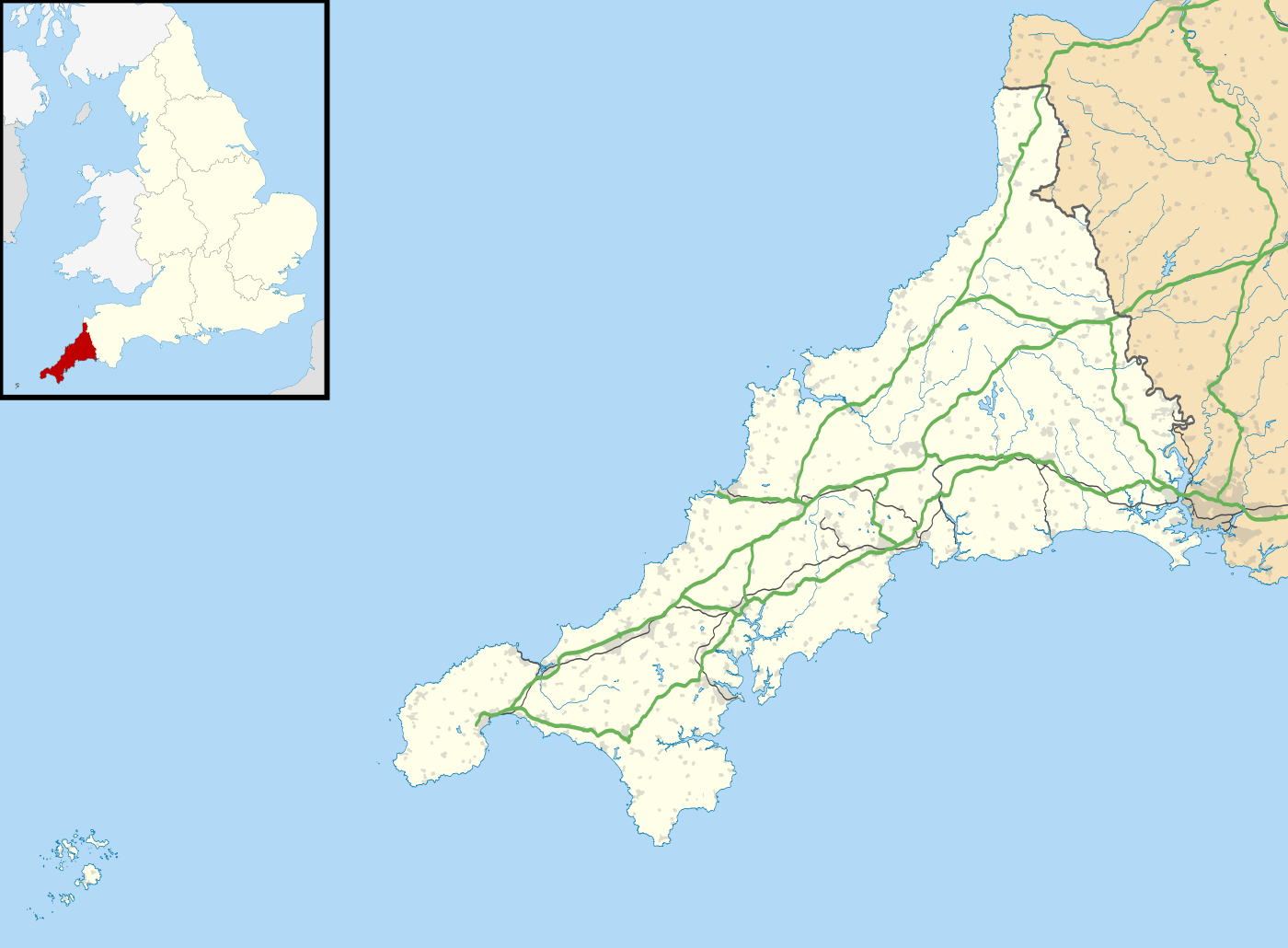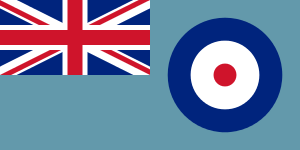RAF St Mawgan
| RAF St Mawgan | |
|---|---|
| Near St Mawgan, Cornwall in England | |
 | |
 RAF St Mawgan Shown within Cornwall | |
| Coordinates | 50°26′05″N 005°00′47″W / 50.43472°N 5.01306°WCoordinates: 50°26′05″N 005°00′47″W / 50.43472°N 5.01306°W |
| Type | Royal Air Force station |
| Site information | |
| Owner | Ministry of Defence |
| Operator | Royal Air Force |
| Site history | |
| Built | 1939/40 |
| In use | 1940-Present |
| Airfield information | |
| Identifiers |
IATA: |
Royal Air Force St Mawgan or more simply RAF St Mawgan is a Royal Air Force station near St Mawgan and Newquay in Cornwall.[1] In 2008 the runway part of the site was handed over to Newquay Airport.[2] The remainder of the station still continues to operate under the command of the RAF. RAF St Mawgan used to have the widest military runway in the UK (300 ft)[3] which is the home for the Cornwall Air Ambulance[4] service and more recently 505 Wessex squadron RAF Reserves.[5]
Current role
RAF St Mawgan is currently home to Defence Survival Training Organisation (DSTO),[6] which is a tri-service unit that teaches 'Survive, Evade, Resist, Extract' (SERE) methods for the Armed Forces in support of operations and training. They also conduct trials and equipment development.[6] It was formerly known as the School of Combat Survival and Rescue and moved to St Mawgan from Mountbatten in 1992.[7]
The Royal Air Force maintains a small workshop on the station, enabling construction of components for the upgrading of aircraft across all three services. Accommodation on the airfield is often used by students of Agusta Westland's training facility at Newquay Airport.[8]
Other lodger units located here at St Mawgan are Plymouth & Cornwall Wing of the Air Training Corps[9] and 505 (Wessex) Squadron Royal Auxiliary Air Force (RAuxAF). The gate guard was an Avro Shackleton aircraft which was sold and moved in December 2015.[10]
As of February 2016, 120 Royal Military Police (RMP) officers of the 1st Military Police Brigade, British Army, will be hosted by the base in a new police investigation unit that will be capable of managing complex police investigations. The main investigation will look at British troops conduct in Afghanistan.[11] Their facility, known as major incident room (MIR), will replicate the benefits of major incident rooms used by Home Office police forces when conducting complex investigations. It will use the same Home Office Large Major Enquiry System (HOLMES) for analysing and linking evidence. The RMP will come under the command of the Provost Marshal (Army). RAF St Mawgan was chosen over other locations for its availability of office and living accommodation. Married personnel and their families will be accommodated in the married quarters sites at Treloggan, St Eval (Officers) and St Columb Minor (Sergeants), which were recently renovated. Single accommodation will be provided on base in spare capacity blocks.[12]
History
Opened as a civilian airfield in 1933, it was requisitioned at the outbreak of the Second World War and named RAF Trebelzue, initially as a satellite of nearby RAF St Eval,[13] but was expanded with twin concrete runways. In February 1943 it was renamed RAF St. Mawgan[13] and in June 1943, the United States Army Air Forces took over and carried out a number of major improvements, including a new control tower and a further extension of the main runway. The airfield was put under care and maintenance on 1 July 1947.
In 1951, it reopened as a Coastal Command base for ASWDU (Air Sea Warfare Development Unit) where trials of new electronic equipment were carried out, to ascertain the suitability of the equipment for general use in Coastal Command, and for maritime reconnaissance, flying mainly Avro Shackleton aircraft, with support from a few Avro Lancaster aircraft. In 1956, No 220 and 228 Long Range Reconnaissance Squadrons were renumbered No 201 and 206 Squadrons[14] and joined by 42 Squadron in 1958.[15] RAF St Mawgan also became the Headquarters of 22 (Helicopter) Squadron. In 1965, 201 Squadron and 206 Squadron moved to RAF Kinloss and were replaced by the Maritime Operational Training Unit.[13]
In 1956, the last Lancaster in RAF operational service left RAF St Mawgan after a brief ceremony conducted by the then Commander-in-Chief of Coastal Command, Air Marshal Sir Bryan Reynolds. The Lancaster was an MR3 variant from the School of Maritime Reconnaissance.[16]
7 Sqn, flying English Electric Canberras, operated at RAF St Mawgan as target tugs from 1970 until 1982, with 22 Squadron moving out in 1974. 42 Squadron and 236 Operational Conversion Unit moved to RAF Kinloss in 1992, taking away RAF St Mawgan's fixed-wing station-based aircraft, the Hawker-Siddeley Nimrods which had been at the station since 1969. In 1976 the film The Eagle Has Landed was filmed on the camp.[17]
In 2005, RAF St Mawgan was one of the airfields shortlisted to house the new Joint Combat Aircraft (JCA) in 2013, but in November 2005 it was announced by Armed Forces Minister Adam Ingram, that it would be going to RAF Lossiemouth in Scotland.[18]
In November 2006, No. 1 Squadron RAF Regiment moved to [19]RAF Honington and No. 2625 (County of Cornwall) Sqn Royal Auxiliary Air Force (RAuxAF) was disbanded.[20] Helicopter maintenance (HMF) also ceased here in that year. Until May 2008, RAF St Mawgan was primarily used as a Search and Rescue training camp and was home to 203(R) Squadron, equipped with Sea King helicopters. The SAR Force HQ was also located here. Both 203(R) Squadron and the SAR Force HQ moved to RAF Valley.[21]
On 1 December 2008 the airfield part of the camp (including the civilian side) closed but the RAF still remain on a reduced area. This was to allow full control of the airport to be handed to Cornwall County Council, with work including a new ATC tower and runway lights. The airport received a full CAA license to operate in December 2008.[22][23]
St Mawgan used to be the home of the Joint Maritime Facility,[24] commissioned 18 August 1995, a command for undersea tracking operated by the Royal Navy and United States Navy. It was announced in early 2009 that the JMF would close in order to save the US Navy £6.5 million per year, losing 22 jobs in the process.[25][26] RAF St Mawgan was the last remaining US Navy installation in the U.K.[27] The remaining personnel from JMF at RAF St Mawgan moved to the US Navy Surface Warfare Centre, Dam Neck, Virginia[28]. Nuclear weapons (primarily B57 nuclear bombs) intended for anti-submarine use by the US Navy P-3 Orion, Royal Air Force Nimrod and former Dutch Navy P-3 Orion aircraft, were stored at the Naval Aviation Weapons Facility, situated at the west end of the airbase.
In February 2013, £11 million was invested in the base to develop a new survival training facility providing key training areas for visiting task groups.[29]
March 2015, the former airfield of the base is a strong contender to be the U.K's first national space port after being short listed by the Government.[30][31]
March 2016, RAF St Mawgan completed a brand new guardroom block, built by Babcock adjacent to the old guardroom but much larger with: a proper car park, office facilities and accommodation.[32]
See also
References
- ↑ "RAF - Home Page". raf.mod.uk. Retrieved 17 March 2016.
- ↑ "History | Newquay Cornwall Airport". www.newquaycornwallairport.com. Retrieved 17 March 2016.
- ↑ "RAF St Mawgan airfield". www.controltowers.co.uk. Retrieved 17 March 2016.
- ↑ "Contact Us | Cornwall Air Ambulance". cornwallairambulancetrust.org. Retrieved 17 March 2016.
- ↑ "RAF - 505 (Wessex) Squadron". raf.mod.uk. Retrieved 17 March 2016.
- 1 2 "Defence SERE Training". RAF St Mawgan. Royal Air Force. Retrieved 7 July 2016.
- ↑ Laming 1994, p. 128.
- ↑ "Flight and Search & Rescue Training at Aerohub in Cornwall". www.aerohub.co.uk. Retrieved 17 March 2016.
- ↑ "Air Cadets - Find a squadron". raf.mod.uk. Retrieved 17 March 2016.
- ↑ "Shackleton aircraft stripped for move from RAF St Mawgan". BBC News. Retrieved 13 December 2015.
- ↑ "Police investigate claims that UK soldiers abused Afghan civilians". BBC News. Retrieved 17 March 2016.
- ↑ "Military police in airbase move". newquayvoice.co.uk. 3 February 2016. Retrieved 17 March 2016.
- 1 2 3 Laming 1994, p. 127.
- ↑ Halley 1980, pp. 204-209.
- ↑ Halley 1980, p. 76.
- ↑ Pitchfork, Graham (2008). The Royal Air Force day by day. Stroud: History Press. p. 322. ISBN 978-0-7509-4309-3.
- ↑ "RAF - History of RAF St Mawgan". raf.mod.uk. Retrieved 17 March 2016.
- ↑ "RAF base loses fighter decision". BBC News. 17 November 2005. Retrieved 13 December 2015.
- ↑ "RAF St Mawgan 'safe for 25 years'". BBC News. Retrieved 17 March 2016.
- ↑ "2625 History". www.2625.co.uk. Retrieved 17 March 2016.
- ↑ here, RAF Details. "RAF - RAF Helicopters In Search and Rescue". www.raf.mod.uk. Retrieved 17 March 2016.
- ↑ Archived 4 December 2008 at the Wayback Machine.
- ↑ Oliver Smith. "Newquay Airport decision to be made this week". Telegraph.co.uk. Retrieved 13 December 2015.
- ↑ "JMF St. Mawgan, UK Installation Guide - Military.com". benefits.military.com. Retrieved 17 March 2016.
- ↑ "A fond farewell to maritime crew". West Briton. Retrieved 17 March 2016.
- ↑ "Base staff lose jobs in US switch". BBC News. 21 January 2009. Retrieved 13 December 2015.
- ↑ "Navy to close last facility in U.K. by May". Stars and Stripes. Retrieved 17 March 2016.
- ↑ Europe, This story was written by Mass Communication Specialist 2nd Class (AW) Chris Henry, Navy Public Affairs Support Element East Detachment. "Navy Takes First Step in Disestablishment of JMF St. Mawgan". www.navy.mil. Retrieved 17 March 2016.
- ↑ "£11m RAF St Mawgan air base investment". Cornish Guardian. Retrieved 17 March 2016.
- ↑ Correspondent, Jonathan Amos Science. "UK ministers issue spaceport shortlist". BBC News. Retrieved 17 March 2016.
- ↑ Correspondent, Jonathan Amos Science. "UK ministers issue spaceport shortlist". BBC News. Retrieved 17 March 2016.
- ↑ "RAF - News". www.raf.mod.uk. Retrieved 17 March 2016.
Bibliography
- Halley, James J (1980). The Squadrons of the Royal Air Force. Tonbridge: AirBritain. ISBN 0 85130 083 9.
- Jefford MBE, Wg Cdr C G (1988). RAF Squadrons. A comprehensive record of the movement and equipment of all RAF squadrons and their antecedents since 1912. Shrewsbury: Airlife. ISBN 1-85310-053-6.
- Laming, Tim (1994). The Royal Air Force Manual. London: Cassell. ISBN 1 85409 190 5.
Further reading
- Saunders, Keith A. (1995) RAF St Mawgan (Britain in old photographs series), 126 pp. Stroud: Sutton (reissued by Universal Books 1998) ISBN 1-84013-195-0
External links
| Wikimedia Commons has media related to RAF St Mawgan. |
- Joint Maritime Facility
- RAF St Mawgan section of helis.com Helicopter History site
- St Mawgan Marines Web Site devoted to US Marines stationed at RAF St Mawgan.
- Website For St.Mawgan Marines RAF St.Mawgan Marines Website.
- Airport information for EGDG at World Aero Data. Data current as of October 2006.
- St. Mawgan 1960-63 Shackletons
